Stock investing requires forward thinking
The old adage says that an investor will make money by "buying low and selling high." But in reality, most investors don't buy at
the bottom of the market but at its top, when purchase decisions seem easier to make.
Right now, most economists are predicting that the United States is in recession. Whether we are in a mild recession or not,
we are certainly in a low growth period that entails a degree of uncertainty. Now is the time to think about the kind of stocks that
would perform poorly in this period. That's pretty easy: consumer durables tend to take the largest hit in periods of economic
weakness. For instance, motor vehicle sales tend to plunge during downturns because consumers are worried about financing
such a large ticket item.
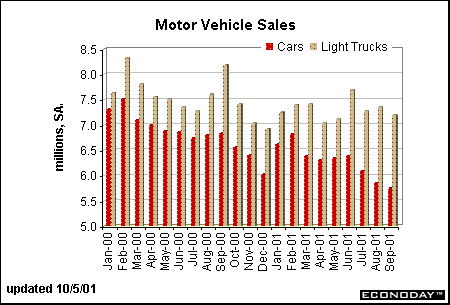
As evident in the chart above, auto sales have headed down during much of 2001 from the levels seen in 2000. At the same
time, light truck sales were holding their own. In total, though, motor vehicle sales were already weakening in 2001 from the
peak levels seen in the previous year. Indeed, given the heady pace of car and truck sales during the boom years of the 1990's
through 2000, one had to believe that these would be headed for a fall soon given the level of saturation. This would suggest
that equity prices of automakers were likely headed for a tumble. Indeed, share prices for GM and Ford Motor Company both
peaked in 1999.
Motor Vehicle Sales versus Stock Prices
The following two charts compare the year-over-year change in motor vehicle sales to the yearly change in stock prices of Ford
and GM. As you can, stock price changes follow the major patterns in motor vehicle sales but differ in magnitude over the time
horizon depicted in the chart (January 1988 - September 2001).
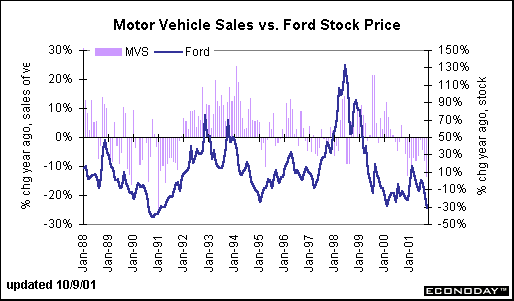
If an investor is trying to determine whether they should purchase a cyclical stock in the auto sector, they certainly need to look
at the economic environment and motor vehicle sales in particular.
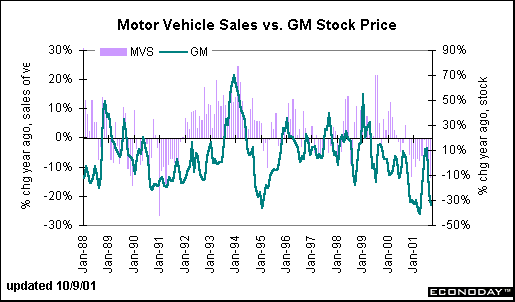
Cars or trucks?
There is no question that stock prices of both General Motors and Ford Motor Company track overall patterns
in motor vehicle sales in a broad sense. However, we can look at more detailed economic data to help us choose which
company's stock will perform better once economic activity picks up steam and consumers are once again scurrying to buy
new cars and SUVs.
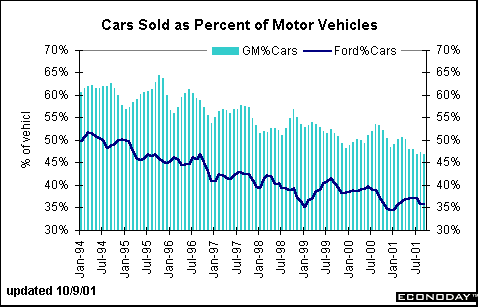
Looking at data for the past seven years, we see that both GM and Ford are selling fewer cars and more light trucks as a
percentage of their total sales. General Motors sells a larger quantity of total vehicles, but a larger percentage of the vehicles
that Ford sells are light trucks. Which is better depends on the profit margins associated with cars and light trucks. If the profit
margins are higher for minivans or SUVs, then Ford might have higher overall margins than GM. Yet, if autos generate higher
margins then GM would have the edge. Typically higher cost vehicles offer larger profit margins; that would suggest that sellers
of minivans and SUVs would benefit more.
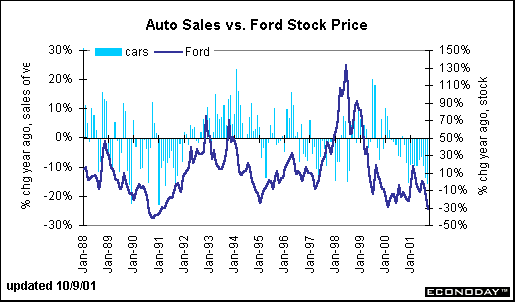
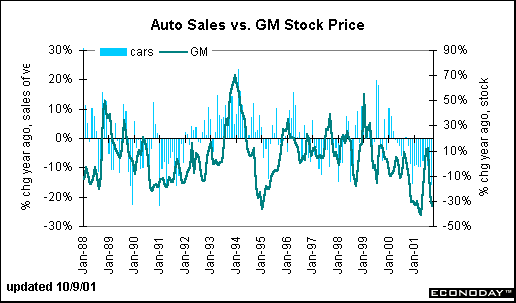
The two charts above compare yearly changes in auto sales relative to the yearly change in the stock price for Ford and GM.
The price of GM's stock seems to mirror the yearly change in auto sales more closely than that of Ford. Looking at the two
charts below, it appears that the yearly change in the Ford stock price mirrors the yearly change in truck sales more closely
than GM.
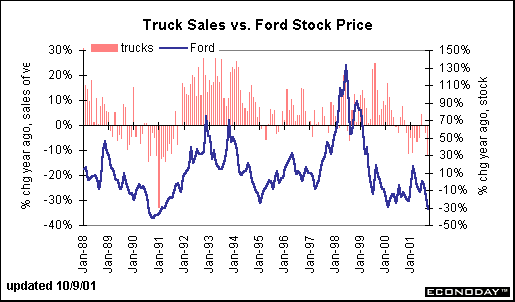
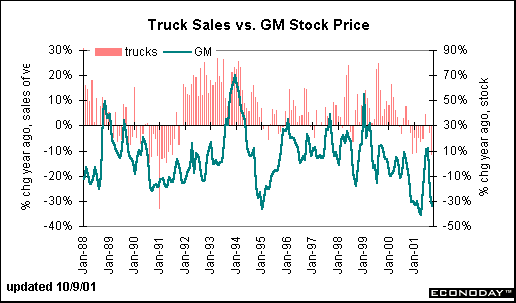
The bottom line
Given the uncertainty in the economy and whether we have seen the bottom yet, it may be a little soon to start buying cyclical
stocks. Investors who are currently holding GM or Ford stock should realize that share prices may not turn around very quickly,
though there is no question that the stocks are likely to recover before the economy as they have during previous recessions. It
would be a good idea to start looking at not only these particular automakers, but also suppliers (tire makers, engine
producers), as they would all start to benefit in advance of the economic turnaround.
Evelina M. Tainer, Chief Economist, Econoday
| 